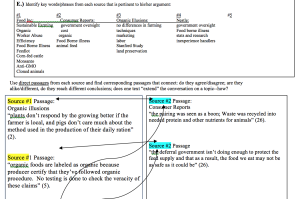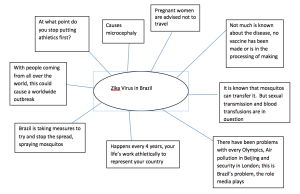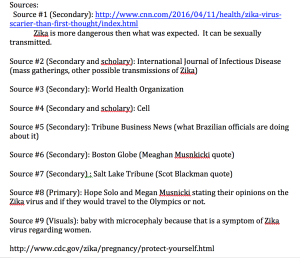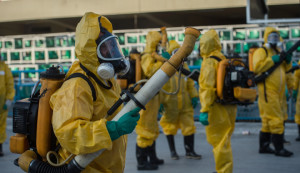- In Unit I this semester I had a lot of trouble trying to working with a few articles at the same time. Trying to incorporate Food Inc., Consumer Reports, Organic Illusions, etc was very difficult to me. Trying to synthesize different texts was the hardest thing we did this semester. If the “Sort it Out” assignment was not given, I would have been extremely lost. Also learning about the writers project helped in all units. We had to find the projects of each food article and see what each author was trying to say but also when we were researching our topic for the next units, we again had to determine what each article was trying to achieve. I really enjoyed the second and third unit projects because it was about something that I was interested in. Unit I was by far the most difficult because of having to synthesis texts.
I thought a highlight of the semester was a few assignments that helped me immensely for each project. I sometimes would be extremely confused on what we were writing about or what we were doing for our final draft and there were a few assignments that made everything clear to me. The “Sort it Out” assignment for unit 1 helped me organize my thoughts. I was able to clearly determine what each project was, find similar topics being discussed in each article, and then find quotes that agreed or contradicted with the same topics.
The “web” document for unit II helped me write out everything I wanted to address in my TED talk.
Lastly, for unit III the last assignment we did in class. When we had to write list out all of your sources and label them as a secondary, primary, or scholarly source. I’m sure I was not the only one but I was very disorganized with all my sources, I had a ton of paperwork from a lot of research and never really put it down on paper the sources I was going to use so this really helped organize me.
The challenges I faced this semester were solved a lot by organization. Organizing my thoughts and putting them down on paper especially helped me when synthesizing texts and helped me in unit I, II, and III.
- I had a term paper due two weeks ago in my sports psychology class. We needed three journal sources. My paper was on athletic injuries and MPFL reconstruction surgery. I went on the library database and almost all of my sources were from ProQuest to find scholarly journals about my topic. Without doing the research I had done in this class, I would not of even thought to use the library’s databases. The research we did in writing was different from other research I have done for classes because I would normally just have to get any source for assignments, never a specific source, a primary or secondary source. I didn’t even know the difference between the different types of sources. In writing I had to go onto databases, find databases that had my topic, select key words that would give me the information I needed, but also eliminate the articles I didn’t want. For other classes, I just go on Google and normally use the first few results. However, because of the research done in writing, I used the databases to find journal sources for my psychology paper.
The main difference I’ve seen for different research writing situation deals with genre. This was shown with the unit II and III assignments. I used some of the same research but it was composed very differently. For my TED talk I took my research and tried to find pictures that best represented the quotes or information I was taking from a source. For unit III, I was able to keep the quotes but also have pictures if I thought it would help get the point across to readers. There was one picture of Brazilian officials spraying mosquitos in my TED talk and it was the only picture I could find. I thought it was easier to describe the picture in a TED talk versus the unit III article. In the TED talk I was able to say, “this picture shows…” and just talk like a normal conversation. In unit III, I placed the picture where I was talking about what Brazilian official are doing about Zika but it still could be unclear as to what’s happening in it.
- I was not as interested in Food Politics as I was with my social controversy. When we were in Unit I, I believe that we were given all the research and articles we needed to read and watch to come up with our article. Everything that needed to be included was handed to us so no research was really needed. It was completely different in Unit II and III. It was definitely a lot harder and time consuming having to get our own information but it did enhance my engagement on the topic. I would see different opinions and new information coming out about Zika that would I would find very interesting and want to learn more about. Especially being able to pick our own topic, I assume most of us picked a topic we wanted to learn about so that made us engaged when we were doing things for our topic. For unit II when we needed to complete the “Sources that matter” worksheet I was getting very annoyed of research. Having to find six different databases got very tedious. I would find a few articles from two or three databases and think those articles would good enough but having to keep looking was very annoying. Especially because I had trouble finding some databases, it was very time consuming.
I thought the first unit was the longest. It dragged on for so long and not being that interested in food politics compared to the other unit assignments, I was bored with the first unit. It was interesting at first but I got less engaged as the unit continued and got creeped out from food politics and never cooked the raw chicken I had in my freezer.
- I would continue with my Unit III NYT article. I can see why its weird that I want to continue working with a article that I wrote two days before the final draft was due, but I really think I could add a lot more information if I had time. I would first want to take it to the writing center but I would want to add more insight from athletes. I looked very hard for athletes from other countries opinions on the Zika crisis but I think maybe if I tried going onto websites that other countries use to see other opinions on Zika. My first draft of the essay was about how it’s not fair to women athletes because they are the ones mainly affected by Zika and question if it affects athletes from underdeveloped countries. I think if I had more time I could work that into my final idea that the public can’t try and pressure athletes or backlash them if they choose to not compete in the games. I could incorporate the idea that the public just can’t pressure female athletes to compete. Maybe if I could find fans reactions to Solo’s quote because she is very well known in America and a key component to the defending Olympic champion soccer team. I could tie their reactions into how the public can’t decide if the virus is actually dangerous or not because it’s the athletes that are sacrificing themselves and putting themselves at risk.
- I would want to show my mom my Unit III NYT magazine article. I would want to show my mom because she is a nurse in the wound care center of her hospital. My mom being a nurse and having the maternal instinct, is very careful when it comes to health issues and being protective as a mom. That’s why I want to show her this article because I want to know what she should think athletes should do. My mom loves sports and has always been a huge fan of soccer because I’ve played it all my life. I want to know her reaction after reading the quote form Solo and Musnicki. I know a part of her would be worried for their kids if they contract the virus, but the other part of her wants to see a competitive Olympic games. Because I have played soccer all my life, I would imagine my mom putting myself in one of the female athletes shoes. I would hope my mom would say to go to the Olympics because if I had the chance to compete in the Olympics for the soccer team, I would go no matter what. I respect my parent’s opinion a lot and would need full support from them to compete. I’m curious to see what my mom thinks about competing or not for a daughter of hers, an athlete she doesn’t know personally, or if it was herself. I would want my mom to say yes to all situations. Take in the information we know about Zika and what we can do to prevent it and try as best as you can to try and not contract the disease.



